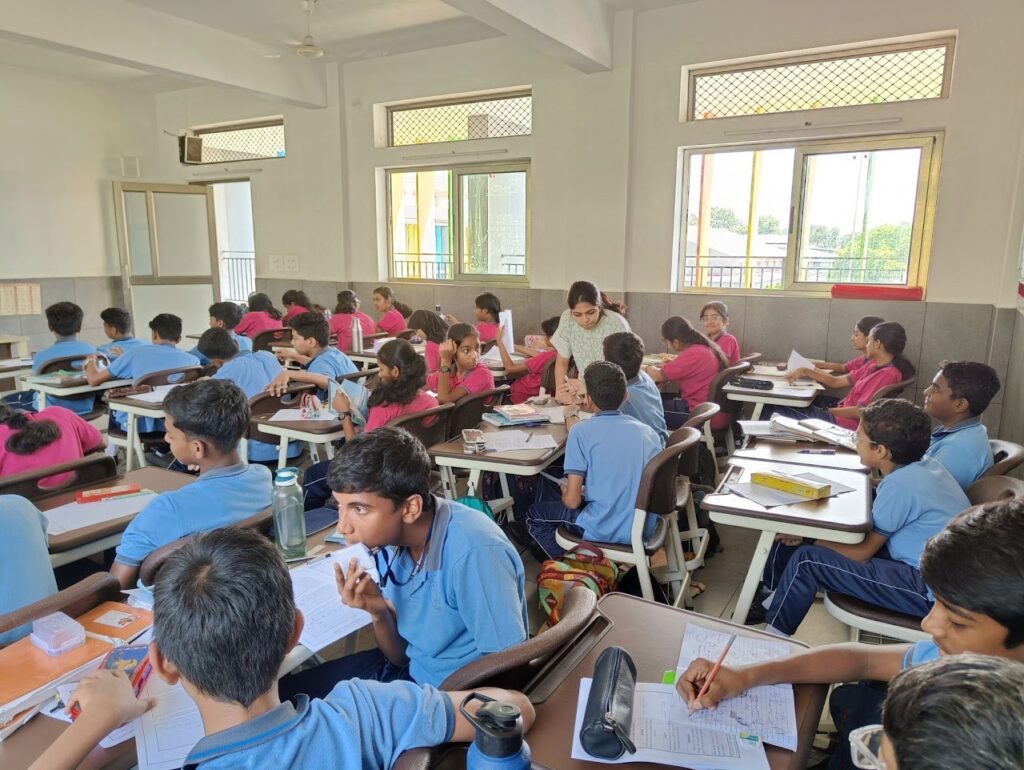Education for Ecological Transformation is a dynamic international research program that aims to create climate-aware youth by fostering environmental consciousness and behavioural change among school students. The program is jointly funded by the Max Planck Society, Munich and the University of Innsbruck, Austria. The program is led by two researchers based in Europe: Prof. Esther Blanco, a Professor of Economics in the Department of Public Finance at the University of Innsbruck, Austria, and Dr. Raisa Sherif, a behavioural economist at the Max Planck Society in Munich.
Currently, the program is being implemented in schools across Spain and Austria. In India, the program is led and implemented by VentureVillage, with active pilot phases already completed across multiple schools.

About the Program
The Education for Ecological Transformation program investigates how raising climate change awareness in young people can influence their environmental values and behaviours. The goal is to help students understand the connection between individual actions and collective environmental outcomes.
Students engage in interactive games, group activities, and thought-provoking exercises that encourage them to reflect on questions like:
“What can we do about climate change?” and “How do my actions impact the environment?”
The curriculum is designed to enable students to:
- Understand the science and social implications of climate change
- Reflect on behavioural change as a means of climate action
- Cultivate a sense of personal and collective responsibility and empowerment
Program Goals
Short-Term:
To cultivate awareness and personal responsibility for climate action among school students by helping them identify small behavioural shifts that can lead to significant ecological impact.
Long-Term:
To nurture a generation of climate-conscious citizens who will lead sustainable initiatives in their homes, schools, and communities. The program aims to build 21st-century skills such as systems thinking, behavioural insight, and environmental leadership.
Learning Approach
The program promotes:
- Experiential Learning – Interactive games and reflections that help students internalize complex climate concepts.
- Critical Thinking – Students are encouraged to question, analyse, and co-create ideas for a sustainable future.
- Collaborative Engagement – Activities foster peer learning, group collaboration, and shared problem-solving.
- Local Relevance – Students link global climate issues to their local environment, making learning more impactful.
Outcome
By participating in this program, students gain:
- A deeper understanding of climate issues and ecological responsibility
- Skills to reduce their ecological footprint
- The motivation and tools to take meaningful action at a personal and community level
Pilot Implementation
The program has been successfully piloted in schools across Spain, Austria, and India, engaging hundreds of students through facilitator-led sessions.
Pilot Schools and Key Highlights:
- St. Peter’s School
First pilot conducted with 188 students participating in hands-on, experiential sessions. - Rajagiri Public School, Kochi
Second pilot with 177 students from Grade 9 across five sections. Sessions were facilitated by a team of eight facilitators on August 8th and 9th. - Alif Global School
Interactive sessions held for 50 students from Grades 7 to 9 on October 11th and 25th, led by three facilitators. - MES Kaithapoyil
Sessions conducted on October 18th and 25th with approximately 100 students and eight facilitators. - MES Thalassery
Final pilot in this phase took place on November 11th and 12th, with 58 students from Grades 6, 8, and 9, guided by five facilitators.
What’s Next?
The upcoming phase of the program is set to scale significantly, reaching 90 classrooms across India during the 2025–26 academic year. This expansion will build on insights and feedback gathered from earlier pilot implementations and will continue to empower young learners to take meaningful action on climate change. As part of this next phase, the program will be implemented in several partner schools, including
- Global Public School, Kochi;
- Christ Nagar Higher Secondary School, Thiruvananthapuram;
- KMO English Medium School, Calicut.
Do you want your school to be part of this? Please connect with us.